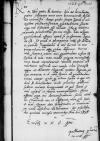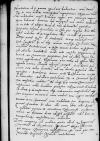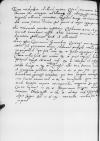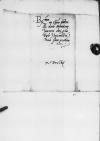Accepi pridie ⌊⌋ Reverendissimae Dominationis Vestrae, quibus praestantissimam gratitudinem suam erga me testatam esse voluit illaque minima xeniola poculentorum per me missa non vulgari gratificandi officio apud se existimare dignata est. Id quod et permaximo mihi est delicio, et exinde singularem Dominationis Vestrae Reverendissimae in me propensionem atque gratiam discerno, nec minus summa animi mei gratitudine refero, quod Reverendissima Dominatio Vestra non modo exigua munuscula mea tanti reputaverit, verum proprium etiam nuntium visendi mei causa cum cerevisia nigra et Alcanto eleganti mittere dignata sit. Quae munera a Dominatione Vestra Reverendissima cum gratitudine animi accepi gratiasque eidem habeo et ago uti domino et benefactori mihi colendissimo, pollicen(do) saltem meritis benignitati et gratiae Reverendissimae Paternitatis Vestrae respondere et facere recompensam. Cuius affectum erga me demonstratum summe attollo.
Commendo me et obsequia mea gratiae Reverendissimae Dominationis Vestrae. Quam diu felicissimam et incolumem ex animo desidero valituram.
 BCz, 1597, p. 339
BCz, 1597, p. 339
Novitatum etsi pauca apud nos habentur, Vestrae tamen Reverensissimae Dominationi non nollem manifestan(do) significare, maxime tandem de valetudine serenissimi ⌊principis⌋ nostri, qua econverso improspera laborat. Dominus Omnipotens conservet ⌊suam maiestatem⌋ incolumem, ne in toto et aliquo ⌊respublica⌋ nostra detrimentum patiatur.
Conventus terrestris generalis in Colo pro vigilia Divae Elizabet indictus et peragebatur. Ill written over [...]n⌈[...] paper damaged⌈[...][...] paper damaged⌉nllll written over [...]n⌉ic nonnulli et primores domini, prout reverendissimi domini, ⌊archiepiscopus⌋, denique ⌊Wladislaviensis episcopus⌋, existen(tes), hi cum omnium communi consensu ⌊conventum generalem⌋ Piotrkoviensem a festo Sancti Andreae in festum Sancti Nicolai limitar written over t⌈trr written over t⌉unt. Modo inito consilio congruere deberent, an ⌊Cracoviam⌋ profecturi sint ad ⌊maiestatis regiae iunioris⌋ postulationem. Postremum ⌊sua maiesta⌋s ab iisdem dominis ingrato animo illorum consensum excepit. Secretarium suum etiam sua maiestas demitten(s) ad eos dominos postulan(s) illorum regressum e ⌊Piotrkovi⌋a itinere recto, ut superinscribed in place of crossed-out in⌈inutut superinscribed in place of crossed-out in⌉ ⌊Cracoviam⌋ versus declinarentur. Ad illam postulationem reverendissimus dominus ⌊Cuiaviensis episcopus⌋ vix consentire videtur et itaque haec variae conventionum institutiones multis hominibus pertaesum induxerunt et inducunt ob illam q consuetam atque veteraneam(!) consuetudinem atque hoc tempore meminen(tes) non modicam tunc vigere caritatem ⌊domini terrae Cracoviensis⌋ cum nobilitate sua dispares elegerunt nuntios: hi alios, illi etiam alios. Inter hosdem a nobilitate primus dominus ⌊Martinus Zborowski⌋ multorum iudicio, nisi Dominus Deus adesset praesidio, nihil boni ac tranquillitatis consultaneum videretur.
Ex ⌊Ungaria⌋ nil auditur praeter illud, quod legationem exspectant ab illo nuntio I serenissimi regis ⌊Ioannis⌋, qui nuper ⌊Cracoviam⌋ ingressurus est, iam pro consumendo reginulae ⌊Isabellae⌋ matrimonio.
 BCz, 1597, p. 340
BCz, 1597, p. 340
Ex ⌊Valachia⌋, et illud certum, ⌊caesarem Turcarum⌋ hanc hidden by binding⌈[nc]nc hidden by binding⌉ terram sibi arrogari ad Killiamque sibi adiunxisse circiter triginta milliaria circuitus, residuum denique, ut aiunt, interce hidden by binding⌈[rce]rce hidden by binding⌉dit anno futuro dicioni suae, prout et nuper appropriare hidden by binding⌈[e]e hidden by binding⌉.
Hic ⌊vaywoda⌋ noviter institutus consiliarios suos et primicerios trucidare iussit. Alios nationis Turcicae in eorum hidden by binding⌈[um]um hidden by binding⌉ dignitates sublimari fecit et collocavit.
Hanc ipsam ⌊conventionem generalem⌋ ⌊Cracoviae⌋ non ⌊regiam hidden by binding⌈[m]m hidden by binding⌉ maiestatem⌋, sed quempiam alium celebrare praedicunt, multis instan hidden by binding⌈[tan]tan hidden by binding⌉tiis praepedien(tibus). Qui sint illi superinscribed⌈illiilli superinscribed⌉, Vestra Reverendissima Dominatio facile cognoscere potest hidden by binding⌈[est]est hidden by binding⌉.
Cetera nulla sunt, quae Vestram Reverendissimam Dominationem scire cuperem, actamen hidden by binding⌈[men]men hidden by binding⌉, quicquid impost evenerit, Vestrae Reverendissimae Dominationi nota face(re) non negligam hidden by binding⌈[m]m hidden by binding⌉.
Mitto denique Vestrae Reverendissimae Dominationi Dobrzinensis superinscribed⌈DobrzinensisDobrzinensis superinscribed⌉ cerevisiae albae tres tunnas (n(ost)rates hidden by binding⌈[s]s hidden by binding⌉) et sexaginta perdices. Dignetur Vestra Reverendissima Dominatio pro sua erga me hidden by binding⌈[e]e hidden by binding⌉ benevolentia gratiose acceptare, qui tam exigua munuscula hidden by binding⌈[la]la hidden by binding⌉ cum sincero animo meo Vestrae Reverendissimae Dominationi transmitto, cum mai(ora) tanto pontifici nequeo. Temporibus congruis hoc ipso Cereris liquore Vestram Reverendissimam Dominationem frequentius invisere curabo.
Dominus ⌊Plothowski⌋, Vestrae Reverendissimae Dominationis nuntius, mihi quam gratissimus adfuit hospes. Hic Vestrae Dominationi Reverendissimae nonnulla verbis suis e exponet.




 BCz, 1597, p. 342
BCz, 1597, p. 342